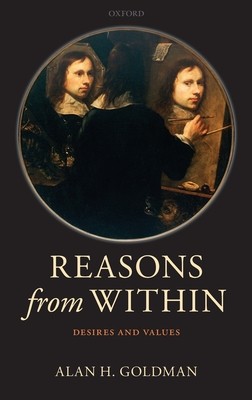
- We will send in 10–14 business days.
- Author: Alan Goldman
- Publisher: Oxford University Press, USA
- ISBN-10: 0199576904
- ISBN-13: 9780199576906
- Format: 15.6 x 23.4 x 1.8 cm, hardcover
- Language: English
- SAVE -10% with code: EXTRA
Reviews
Description
Do the reasons we have for acting as we do derive from our concerns and desires, or are there objective values in the world that we are rationally required to pursue and protect? Alan Goldman argues for the internalist or subjectivist view of practical reasons on the grounds that it is simpler, more unified, and more comprehensible than the rival objectivist position. He provides a naturalistic account of practical rationality in terms of coherence within sets of desires or motivational states, and between motivations, intentions, and actions. Coherence is defined as the avoidance of self-defeat, the defeat of one's own deepest concerns. The demand for coherence underlies both practical and theoretical reason and derives from the natural aims of belief and action. In clarifying which desires create reasons, drawing on the literature of cognitive psychology, Goldman offers conceptual analyses of desires, emotions, and attitudes. Reasons are seen to derive ultimately from our
deepest occurrent concerns. These concerns require no reasons themselves but provide reasons for many more superficial desires.
EXTRA 10 % discount with code: EXTRA
The promotion ends in 20d.09:37:39
The discount code is valid when purchasing from 10 €. Discounts do not stack.
- Author: Alan Goldman
- Publisher: Oxford University Press, USA
- ISBN-10: 0199576904
- ISBN-13: 9780199576906
- Format: 15.6 x 23.4 x 1.8 cm, hardcover
- Language: English English
Do the reasons we have for acting as we do derive from our concerns and desires, or are there objective values in the world that we are rationally required to pursue and protect? Alan Goldman argues for the internalist or subjectivist view of practical reasons on the grounds that it is simpler, more unified, and more comprehensible than the rival objectivist position. He provides a naturalistic account of practical rationality in terms of coherence within sets of desires or motivational states, and between motivations, intentions, and actions. Coherence is defined as the avoidance of self-defeat, the defeat of one's own deepest concerns. The demand for coherence underlies both practical and theoretical reason and derives from the natural aims of belief and action. In clarifying which desires create reasons, drawing on the literature of cognitive psychology, Goldman offers conceptual analyses of desires, emotions, and attitudes. Reasons are seen to derive ultimately from our
deepest occurrent concerns. These concerns require no reasons themselves but provide reasons for many more superficial desires.


Reviews